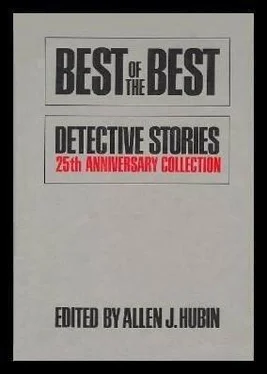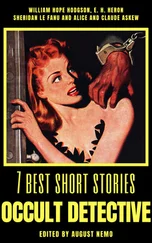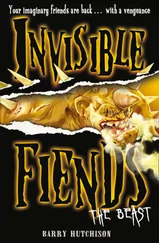Stephen Barr - Best of the best detective stories - 25th anniversary collection
Здесь есть возможность читать онлайн «Stephen Barr - Best of the best detective stories - 25th anniversary collection» весь текст электронной книги совершенно бесплатно (целиком полную версию без сокращений). В некоторых случаях можно слушать аудио, скачать через торрент в формате fb2 и присутствует краткое содержание. Город: New York, Год выпуска: 1971, ISBN: 1971, Издательство: E.P. Dutton & Co., Жанр: Детектив, на английском языке. Описание произведения, (предисловие) а так же отзывы посетителей доступны на портале библиотеки ЛибКат.
- Название:Best of the best detective stories: 25th anniversary collection
- Автор:
- Издательство:E.P. Dutton & Co.
- Жанр:
- Год:1971
- Город:New York
- ISBN:978-0-525-06450-3
- Рейтинг книги:5 / 5. Голосов: 1
-
Избранное:Добавить в избранное
- Отзывы:
-
Ваша оценка:
- 100
- 1
- 2
- 3
- 4
- 5
Best of the best detective stories: 25th anniversary collection: краткое содержание, описание и аннотация
Предлагаем к чтению аннотацию, описание, краткое содержание или предисловие (зависит от того, что написал сам автор книги «Best of the best detective stories: 25th anniversary collection»). Если вы не нашли необходимую информацию о книге — напишите в комментариях, мы постараемся отыскать её.
Best of the best detective stories: 25th anniversary collection — читать онлайн бесплатно полную книгу (весь текст) целиком
Ниже представлен текст книги, разбитый по страницам. Система сохранения места последней прочитанной страницы, позволяет с удобством читать онлайн бесплатно книгу «Best of the best detective stories: 25th anniversary collection», без необходимости каждый раз заново искать на чём Вы остановились. Поставьте закладку, и сможете в любой момент перейти на страницу, на которой закончили чтение.
Интервал:
Закладка:
“Blowing up the Brooklyn Navy Yard,” said Don Tex Thompson reflectively, “might be just the thing the national economy is in need of. Unemployment among skilled laborers went up seven-point-oh-nine percent in the last fortnightly period, and among unskilled laborers the figure scores an even higher percentile. The Mafia,” he said, “cannot remain indifferent to the plight of the workingman.”
“Not if it is to retain that position of esteem and preeminence to which it is rightly entitled,” said Don Morris Caplan.
“To say nothing of the excellent effect upon our National Defenses of clearing out all that obsolete equipment and replacing it with the newest devices obtainable through modern science,” Don Shazzam X (formerly Rastus Washington) declared. “The Congress could scarcely refuse appropriations in such circumstances.”
Don Wong Hua-Fu pursed his thin lips and put the tips of his six-inch fingernails together in church-steeple fashion. “The Honorable Ten Tongs do include sound common stocks in the various heavy-metals industries in their portfolio. Still,” he said, “we must consider the great burdens already borne by the widows and orphans who constitute the majority of American taxpayers.”
And Don Leverret Lowell Cabot pointed out another possible objection. “We cannot neglect our own heavy commitments in the Brooklyn Navy Yard area,” he said. “As part of our responsibility to the men who man our country’s ships we have, need I remind the Grand Council, leading interests in the bars, restaurants, night clubs, strip-joints, clip-joints, and gambling hells of the area — to say nothing of the hotels used for both permanent and temporary residence by the many charming ladies who lighten the burdens of the sea-weary sailors.”
“It’s a problem, believe me ,” sighed Don Gesú-Maria Gomez. “Little does the public know of our problems.”
“Decisions, decisions, decisions!” Don Swede Swanson echoed the sigh.
“Gen-tle-men, gen-tle-men,” said Don Lefty McGonigle, a note of mild protest in his hoarse voice. “Aren’t we being a lit-tul pre-ma-chua? We are not being asked to blow up duh Brooklyn Navy Yahd dis minute. We are not even being asked to de cide if it should be blown up dis minute. All we are being asked to do, gen-tle-men, is to decide if we are going to make a soyvey of de Iowa East Trivva estuary from d’ point of view of its amen-i-ties as a pos-si-ble headquarters faw moychant marine offices. I yap-peal to you. Grand Master, am I creckt?”
Don Alexander Borjia tore his eyes away from the Mona Lisa on the wall. The lineaments of La Gioconda never ceased to entrance him, and there was the added fillip to his pleasure that the rest of the world naively thought the original still hung in the Louvre, little realizing that this last was a mere copy, painted, true, by Leonardo, but by Leonardo in his ancient age. The switcheroo had been arranged by Don Alexander’s father, the late Grand Master Don Cesar Borjia, before the First World War. Copies of master-works of art, stolen at various times from museums and private collectors around the world, adorned the other walls. But Don Alexander Borjia’s favorite remained the Mona Lisa.
“Don Lefty McGonigle is correct,” he said. “Take the contract for the survey, charge them eighty-seven million dollars for it, and when it comes time for a decision on the big question, so we’ll leave them know further. All in favor say Aye . Opposed, Nay . The Ayes got it.”
There was a silence.
“A foyda question,” said Don Lefty finally. He fingered the cabochon emerald which nestled in his watered-silk four-in-hand, and fiddled with his eyepatch.
“Speak.”
“Whom is to be ap-poin-ted to take over d’ soyvey?”
“Whom did you have in mind?”
“A young man which he oughta be given more responsibility than he’s being given, to wit, my son-in-law, the Second Vice-President of the Mafia, Lower Manhattan Branch. Woddaya say, gen-tle-men?”
The pause which followed this suggestion seemed faintly embarrassed. Then Don Swede Swanson was heard to express the opinion that Don Sylvester FitzPatrick couldn’t find the seat of his pants in the dark with both hands.
Don Lefty turned to him and pressed both his hands to his chest. “You wound me!” he exclaimed, his voice deep with suppressed emotion. “Night afta night I come home an’ my liddle Philomena is eating huh haht out. ‘Daddy, Daddy, Daddy,’ she asks, weeping, ‘what has everybody got against poor Sylvester? Din’t he soyve his apprenticeship the same as everybody else? Is-int he loyal? Trustwoythy? Coyteous? Kind? So why, afta twelve years, is he still only in chahge of ahtichokes at Wahshington Mahket?’
“An’ ya know what? I don’t know what to say ta huh! If fit was a matta of money, so I’d buy him a sand-and-gravel company, or a broory. But it’s a matta of tra- di -tion, gen-tle-men! All of youse got sons. I ain’t got no son! All I got is my liddle Philomena. A bee-uty in thuh Hollywood sense a thuh woid she may not be, but she yiz the yimage of huh sainted mother, rest her soul, an’ huh husband is like a son ta me, so when ya spit on him , gen-tle-men, it’s like ya spitting on me! ”
Throats were cleared, eyes wiped, noses blown. Don Alexander essayed to speak, but was prevented by emotion. At last the silence was broken by Don Swede Swanson. “So let it be Sylvester,” he said huskily. There was a chorus of nods.
“Of course, there is one hazard of the chase involved in my sweet Sauncepeur’s snaffling hot broils off these outdoor grills,” Lord Grue and Groole observed. “It — shall I sweeten the air in here a bit? I’ve a packet of frankincense that my friend, Osman Ali the Somali, sent me not long ago; I wouldn’t buy incense, of course,” he said, sprinkling the pale yellow grains on the glowing embers. A pungent order filled the cave.
Denny the Dip coughed. The Marquess donned his gauntlet and examined the falcon’s talons, particularly about the pads. “It makes the poor creature’s petti-toes sore. I’ve experimented with various nostra and it’s my considered opinion that Pinaud’s Moustache Wax is above all things the best. Is there anything more left in the flask? Shall we kill it, as you say over here? Ah, good show.”
With a gesture he motioned to Denny to take the bed; he himself reclined on a tiger skin which was stored during the day in a dry niche. Thus settled, he grew expansive. “Ah, it’s not what I’ve been accustomed to, me that used to have my own shooting lodge in the grouse season, waited on, hand and foot, by a dozen Baloochi servants; well, and now here I am, like a bloody eremite, living on me wits and the $5.60 I get from home each week.”
Denny lifted his head. “You’re a remittance man?” he inquired.
“Sort of remittance man, you might say, yes. Me nevew, Piers Plunkert, pays me two quid a week, not so much to stay away as to stay alive. ‘Avoid alcohol, Uncle,’ he writes, ‘and mind you wear your wooly muffler when the north wind blows.’ It’s not filial piety, mind, or avuncular piety, or anything like it. You see, if I pop off, he becomes the twelfth Marquess of Grue and Groole, and all the rest of that clobber — the mere thought of it makes his blood run cold. No, he’s not a Labour M.P.; his fix is worse than that. He’s one of the Angry Young Men!
“Struth! Lives in a filthy little room in South Stepeny, and composes very bad, very blank verse damning The Establishment, under the pseudonym of ‘Alf Huggins.’ Well, now, I ask you — would you pay any attention to an Angry Young Man named Lord Grue and Groole? No, of course you wouldn’t. And neither would anyone else.
Читать дальшеИнтервал:
Закладка:
Похожие книги на «Best of the best detective stories: 25th anniversary collection»
Представляем Вашему вниманию похожие книги на «Best of the best detective stories: 25th anniversary collection» списком для выбора. Мы отобрали схожую по названию и смыслу литературу в надежде предоставить читателям больше вариантов отыскать новые, интересные, ещё непрочитанные произведения.
Обсуждение, отзывы о книге «Best of the best detective stories: 25th anniversary collection» и просто собственные мнения читателей. Оставьте ваши комментарии, напишите, что Вы думаете о произведении, его смысле или главных героях. Укажите что конкретно понравилось, а что нет, и почему Вы так считаете.












